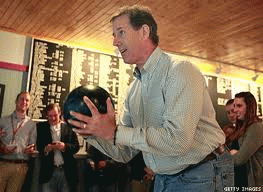Santorum's conspicuous kegling was "really meant to be a cultural story, who Rick really is," his chief strategist John Brabender told the New York Times. "I think every presidential candidate wants people to get a peek into their real life so they can make a value judgment." But the entire made-for-media affair reveals more about Santorum's backward-looking campaign than it does about his cultural values --especially viewed in light of another presidential campaign story in the same edition of the erstwhile paper of record, headlined "As Viewing Habits Change, Political Ads Switch Screens." As Jeremy M.Peters reported, "Mitt Romney's campaign thinks it has found a way to get its ads in front of the increasing number of voters who are not watching traditional television: Find these people online, and show them the ads there."
While Santorum has been busy throwing balls and strikes, "the Romney campaign and a team of online behavior analysts have spent 18 months" sifting through data on the browsing habits of tens of millions of computer users as the campaign builds a richly detailed cache of potential supporters," Peters noted. "In doing so, Mr. Romney's strategists are hoping to turn the Web into a political persuasion tool, signaling a shift in the way modern campaigns view digital advertising. It is no longer merely a supplement for traditional media like television. In some cases, it is a substitute entirely."
Meanwhile President Obama's team is also deep into the use of digital data, and his campaign has even hired a private sector specialist to help find ways to target online messages to voters. As Darrell M. West, director of the Center for Technology Innovation at the Brookings Institution, told Peters, the 2012 campaign "will likely become the first truly digital election."
A similar analysis is at the center of my forthcoming book Friends, Followers and the Future: How Social Media are Changing Politics, Threatening Big Brands, and Killing Traditional Media. In it I explain how the emerging media's new online social networks possess unique characteristics that make them very different from the old, off-line and real-world social networks described by Professor Putnam in Bowling Alone. To Putnam, social capital "refers to social networks, norms of reciprocity, mutual assistance and trustworthiness." Thanks to their ability to facilitate the easy formation of groups, online networks like Facebook with its 800 million users are creating a vast increase of social capital, rather than furthering the breakdown noted years ago by Putnam (and apparently just this week by Santorum!)
There are different types of social capital, and ultimately, Robert Putnam told me, one distinction "among the many different forms of social capital" is especially important: the fact that "some networks link people who are similar in crucial aspects and tend to be inward-looking--bonding social capital. Others encompass different types of people and tend to be outward-looking--bridging social capital." Putnam, who once taught Mark Zuckerberg's roommate at Harvard, noted that online socnets foster more "weak ties" (casual acquaintances, colleagues), and that their strength lies in providing a wide range of perspectives, information, and opportunities with greater numbers of people than real world networks, which create "strong ties" (with family and close friends, for example) but with far fewer people.
In today's society, access to information is a key element of status and power and communication is instant, ubiquitous and mobile. Social networking sites are a primary product of this emerging culture. Modern social networking technologies provide people with a very low cost (in terms of time and effort) way to maintain looser or weak social ties, thus enabling a scenario in which people have huge numbers of diverse, but not very close, acquaintances and encouraging us to bridge disparate clusters of friends and followers, who in turn provide us with access to new knowledge. Weak ties of "bridging social capital"--the kinds that exist among people one knows in a specific and limited context--are excellent sources of novel information, and a person who has many weak yet heterogeneous ties has access to a wide range of perspectives.
"It's hard to imagine we can fix problems outlined in Bowling Alone without the Internet," Putnam told me. "In some respects at least, we need the Net to fix things, to make it possible to strengthen and create new ties among people. We need to create more alloys and ways to use the Net, like the telephone was used in the past, to strengthen and deepen previous ties, so the Internet might actually help revive social networks in America."
Barack Obama gets that. So does Mitt Romney, who at least is looking forward for his cultural clues. Looks to me like Rick Santorum will soon be bowling alone.





